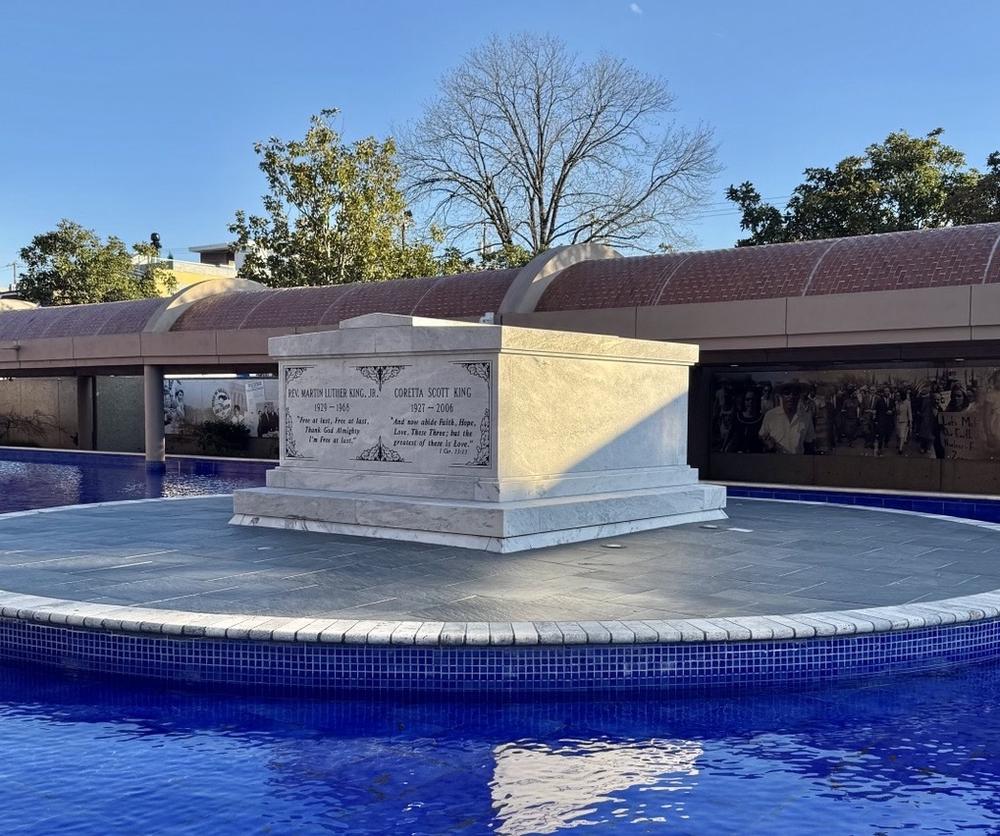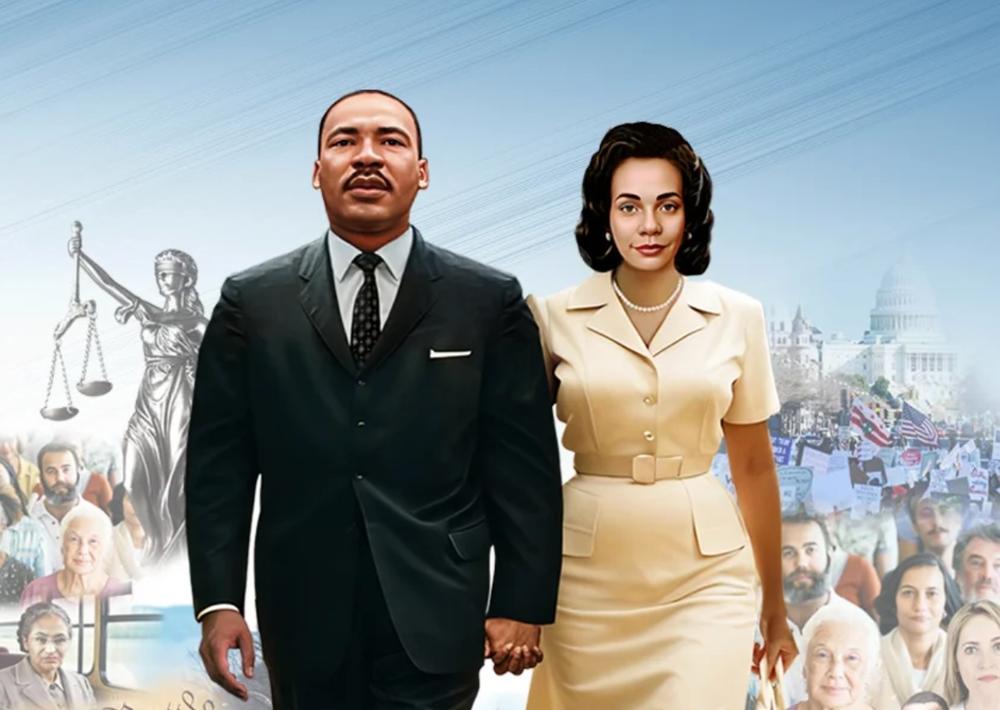
Caption
The crypt of Martin Luther King Jr. and Coretta Scott King is pictured at the King Center in Atlanta on Jan. 3, 2025.
Credit: GPB
LISTEN: Dr. Bernice King, Martin Luther King's youngest child, joins GPB's Kristi York Wooten in the Talk Studio for a conversation on nonviolence in the 21st century, the power of words in context and a preview of MLK Day 2025.

The crypt of Martin Luther King Jr. and Coretta Scott King is pictured at the King Center in Atlanta on Jan. 3, 2025.
As Atlanta prepared to celebrate the Martin Luther King Jr. holiday, Dr. Bernice King, CEO of the King Center, stopped by the GPB Talk Studio. The King Center hosted several events this month to honor what would have been the civil rights leader's 96th birthday.
On Jan. 18, the King Center features its MLK Jr. Beloved Community Awards and on Jan. 20 at 9 a.m., the holiday kicks off with the Beloved Community Commemorative Service at Ebenezer Baptist Church featuring Bernice King, Sen. Raphael Warnock, the Rev. William Barber, and others.
In our wide-ranging interview, the daughter of Martin and Coretta Scott King discusses the relevance of her father's messages of nonviolence in today's world, her remembrances of former President Jimmy Carter, MLK Day falling on the same day as the presidential inauguration and why the power of words matters in the 21st century.
This interview has been edited for length and clarity.
He was my favorite president, I'll say that. And because he was a sincere about his faith and his care for humanity, a very thoughtful leader and really wanted what my father talked about as the eradication of the triple evils of poverty, racism and militarism. His life seemed to align with that.
As the CEO of the King Center, it means a great deal to the King Center because he signed the legislation establishing the King Historical Site and Preservation District that now is the Martin Luther King Jr. National Historical Park as of 2017. And we sit in the boundary lines of that historical park as the King Center.
But more importantly, he was very instrumental in helping to raise money for the initial campus of the King Center. The first official fundraiser took place at the White House and raised about $3.5 million, which is somewhere around 30% to 40% of the ultimate cost of the King Center. So he's been — he was very supportive of my mother's efforts, appointed her to the United Nations as a delegate and hung a portrait of my father at the [Georgia] Capitol as governor at a time when there was a lot of resistance to that.
The courageousness which he exhibited; it was very critical. He included a lot of Blacks in his administration as well as when he was elected president. My mother worked on a team of people who advised on candidates for the federal judicial courts. And obviously, the Nobel Peace Prize, though they both also received the spoken word Grammy. Both of them. [Carter] never met my father, which is amazing. But his life, I believe, ultimately paralleled my father's life and his commitment, as I said, to humanity.
And, you know, just a selfless leader, other-centered and very compassionate and down to earth, no pretension, but would speak his mind. I think that's what we'll miss today on some of the very controversial and difficult issues. You know, he never minced his words, but when you heard him, he was someone who was not insulting. But you could hear someone who had deep care and concern and compassion about whatever was happening with a particular issue. And he demonstrated, more importantly, what it meant to be a servant and a lover of humanity. You know, words, you know, can be just rhetoric. But he lived out the words that he spoke.
It’s interesting to me that before the King holiday, President Carter passes at the end of the year. And so, you know, beginning the year, having to, you know, remember and reflect upon his life and hear all of the stories about things that he did as a president, as we anticipate the inauguration of a new president, it's almost as if, "Hey, as this year begins and you're looking towards the inauguration of a president? This is what a president looks like and should represent." … and on top of that, boom! we got Dr. King's holiday on the 20th? And so it's right in our face as a humanity that no matter what's happening or what people feel about that day of the inauguration, this is a reminder of who we are to be, how we are to operate and function and act as a nation, as a humanity.
I am excited about the possibility of this holiday because as we laid out in our [King Center] theme for the year, “Mission Possible,” protecting freedom, justice and democracy, in the spirit of nonviolence, we have an opportunity to really draw even more attention to the manner and the attitude and the way in which Dr. King did things, in contrast to the way that President Trump and his first administration did things and dealt with people.
What is possible is that we can continue to cultivate and protect freedom, justice and democracy if we — if we align ourselves with the teachings of my father: nonviolence and not just the actions, but the mindset that he left for us to consider. When we are approaching, you know, championing causes, we can't do it from a place of bitterness. Anger is fine because anger can be channeled into, you know, righteous anger, you know, righteous indignation because it's not seeking to destroy or defeat or humiliate people. It's really seeking to bring about a more just and humane outcome.
So, you know, this is perhaps one of the best times for the teachings of Martin Luther King, Jr. And I think that's why [the inauguration] occurred on the King Holiday. No person did that. So that's like a message from God, you know? "Hey, you all, let’s get back to these teachings, you know, let's realign ourselves with that movement." And that movement is not just about speaking up and speaking out. It was about utilizing the principles, the mindset and the methodology of nonviolence.
I don't think it's either-or. I think it's a both-and. Nonviolence works on you first. I think if more and more people understood that, they would not say it doesn't work, because it's designed to do work on you inwardly. It's designed to help you transform so that you can become a vessel for creating the means to get to that outcome of peaceful ends. You can't get to peaceful ends through violent means. And so there's some cleansing and purging and some, you know, reflection that people have to be willing to do. And there's some decisions that people have to make to commit to that way on a daily basis. So from the individual perspective, yes, it is about the individual in that way. But it's when those individuals are centered themselves in that — in that vein and they collectively come together, then that's where the power and the energy ... and even the courage … it's hard to be courageous alone. … And so nonviolence is, the way we define it, is a love-centered way of thinking, speaking and acting, engaging that leads to personal, cultural and societal transformation … And it may not be instant, but if you stick with it and you do it consistently as a collective — because the collective has to do it because the force that, you know, it's coming against is so strong and powerful — it wins. It, it literally wins — not over people, but it wins for justice. It wins for freedom. It wins for humanity.
No. 1, my father was very intentional about his words. You know, he wasn't just speaking to spout out something. There were lessons in what he was saying. There was instruction, there was wisdom, and inspiration in what he was saying. And so — and there was context, more importantly. You know, it's important that we just not — just like what we do in the Bible, sometimes — it's important that we just not take words out of their context and just kind of insert them somewhere. Know there's a background to these words. You know, there's things associated with these words at the time that they were spoken. ... But then again, with his words, they seem to be transcendent of time as well, because there were some universal truths in what he was speaking.
But when he said the time is always, most people say, R-I-G-H-T to do R-I-G-H-T. And my father was a little bit more poetic just in his writing and his speaking. And he said the time is always R-I-P-E to do R-I-G-H-T. … I feel that it's important to make sure that people [are] not just quoting but quoting in the right context. But that eventually we don't just use his words, you know, as a weapon, but we begin to emulate those words. That's what's really important, you know. We remember the man. And that's what my mother was trying to do is to push us to remember the man and remember the message and live out that message.
You know, one of my favorite words and what I believe is the most important word in the Bible is "remember." And the reason is because whenever we forget certain critical things, then we lose sight of what is possible going forward. And that's why this theme we have is Mission Possible. And I want people to hear that "possible" because there are some things that seem impossible right now. It seems impossible to rid ourselves of those triple evils that my father talked about — poverty, war and militarism. But the mission is possible because it's a collective mission — collective not just with us here today, but collective as a humanity.
And so we remember that there were parts of our humanity before we got here. Before we were born, previous generations dealt with uncertain times, difficult times, challenging times. But they found a way in the human ingenuity and spirituality to forge forth ahead and to transform in some instances and overcome in other instances and push through. And we come from those ancestors as a collective. And if we can just remember that, that will give us the strength that we need and even the courage we need, because we can draw from the fact that, "Wow, look at what they were able to do and face with such, you know, conviction and in some instances, bravery and fearlessness." And so since I'm a part of that DNA, then I need to operate in that vein.

And that's why on our [MLK Day event] images this year, the graphics, we had my mother and father kind of clasped, you know, to show connection, to show unity, to show It's a collective. It's not just an individual thing that the mission is possible. And these are two individuals that we know the history and story of. So that gives us the fervor to move forward.